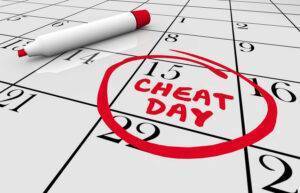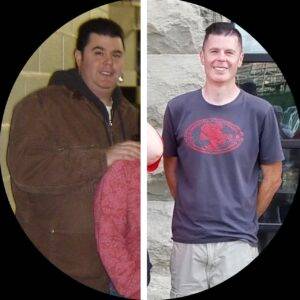 By Brian Wiley
By Brian Wiley
In most cases, I don’t think using the term “cheating” to describe a deviation from your diet is appropriate, because cheating is defined as “acting dishonestly or unfairly in order to gain an advantage.” In most cases, there is no advantage to cheating with your food choices. Toward the end of this article, I will explain how the term cheating might sometimes be more appropriate.
Cheating while doing low carb & keto has been a popular subject lately. Some people use “cheats” to help them with fitness goals, others reserve cheats special occasions, or to keep the body guessing.
Whatever the reason, for the majority of us, “cheating” usually puts us on a slippery slope that ends badly. I have seen far too many people over the years undo months and even years of success, all because of a single cheat meal.
I’ve seen a single slice of cake undo a 100-pound weight loss, because that one slice of cake turned into a cheat meal, which then snowballed into a day, then a week, month, and eventually a permanent turn back to the Standard American Diet (SAD).
This is why I advise against cheats, because most of us who became obese got that way because we were addicted to these foods, and couldn’t control them in the first place.
Moderation is meaningless in the face of food addiction. It’s a problem that should be treated as any other disease or addiction. You don’t recover from alcoholism or drug addiction by moderating whisky and heroin, so why does doing so make sense when it comes to food? The answer is simple: it doesn’t.
With the subject of cheating constantly coming up, I recently reflected on my personal experiences and made some interesting connections.
First though, for those of you who don’t know me, I started low carb in January 2009. In those days, you couldn’t find low-carb and keto products in stores or online, and there were not endless recipe sites or books available like there are today. In fact, you could barely find any information on how to satisfy sweet cravings, and many people didn’t even know what keto was. Atkins bars were about the only thing around and they were so expensive that it wasn’t something most people could afford to indulge in too often.
My first cheat day didn’t come until about eight months into my journey. I remember it well… we were on vacation and I had already determined I was going to take a day or two and eat whatever I wanted, feeling confident that I could easily jump back on track.
My first “hit” was some white chocolate macadamia nut pancakes from IHop. I scarfed them down quickly, and as I was thinking about how awesome they were, I was already planning my next meal. I was on the blood sugar roller coaster, and quite honestly, I was enjoying the ride.
About two hours after eating that meal I felt like pure trash. I got a headache, was bloated, and had low energy and felt fatigued. I wasn’t hungry but still felt the need to eat. Once we settled in, I ordered pizza and wings, and was going all in again. I felt even worse than after the pancakes, but continued to eat. A few hours later I was hungry again and started eating ice cream.
I woke up feeling horrible but pretty much repeated the same pattern the next day, eating high-carb garbage until I almost burst. Another two to three hours later hours later I was hungry again, and I repeated the process until bedtime.
After two days of this, I was tired of the blood sugar roller coaster and I was ready to hop off. Surprisingly, I was able to just stop, because I felt so awful. It took about three days before I started feeling better.
The resulting damage was a 12-pound weight gain and a small bout of detoxing (Keto/Atkins flu). I was still early in my journey and still in a weight loss phase, so the 12 pounds of water and actual fat I gained during that weekend was gone in a week, and I started losing again.
This gave me a false sense of security, like I got away with something, and I thought to myself that down the line I could do this again. Not a smart idea.
My next cheat day was a couple months later and was planned. I remember the night before I bought a little bit of every high-carb food I used to eat. I bought doughnuts, pastries, snack cakes, ice cream, cookies, and chips. I planned to eat pizza, Chinese food and whatever else I wanted.
When I woke up, the doughnuts weren’t doing it for me, so I stopped and went for Twinkies. They weren’t doing it for me either so I kept eating a little bit of this and a little of that, seeking the sugar reward.
Years later, I realized I was like an addict. I was chasing and looking for that sugar high and it never came, so I kept moving from food to food. Once I couldn’t eat anymore I’d crash, and three hours later, once the sugar drop came, I would seek it out again. I would do this until I physically couldn’t eat anymore, and felt so bad that I had to stop and get back on track to feel normal again. When I did, just like with any substance abuse addict, I would go through the withdrawal symptoms from the Atkins/Keto flu.
In addition, there was the massive 10-15 pounds of water and fat gain, but every time I would get rid of it quickly and lose a little in a short amount of time. You would think that I would stop but it was a slow, hard lesson to learn. Over the next couple years, I would do this same routine over and again.
But once I reached my goal weight and had been stable there for a while, I noticed something. The cheat foods were no longer as appealing as they once were but everything else was the same – the bad feeling and the huge weight gains. It was also taking several weeks to get rid of the bloating and water and fat gain. I was not having the cheats as often, but still not sure why I was even having them period.
Toward the end of 2012 my father passed away and it was a very stressful time for me. I took it pretty hard and for a couple of days I just went off track. Combine the feeling you get from eating high-carb foods, being depressed from grieving, and dealing with the post stress of taking care of everything, it wasn’t easy for me to start eating trash, then stop and refocus and jump back on track. The post weight was different this time, I gained like 10 pounds, but this time my body held onto it. It was because of the stress, I assume, but no matter what I did, the scale would not move,
It was at that point that I went back to basics, began cardio, upped my workouts, and after a few months I just accepted the fact that the extra weight was there to stay, I didn’t worry about it because I was still in a good place weight and health-wise, I held onto that 10 pounds until early 2014. That’s when stress was decreasing and keto was gaining popularity, so I incorporated some keto into my diet.
I made some very small adjustments like swapping nuts for avocado and eating more fish and seafood. That small change knocked the 10 pounds out in like two weeks. That taught me the smallest adjustments can have the biggest impact on low-carb results.
I also started incorporating more days of keto into my diet after that, basically when my body felt it needed more I went for the higher healthy fat days. This strategy really cut down the cheat days. I was only having them during holidays and special occasions at this point, but was still having them. I was making progress, but it was scary to know these days were still a part of me.
I am really lucky that those foods make me feel so bad that it’s easy for me to just stop and get back on track, and not look back for a few months.
Fast forward to 2015. Keto was now gaining momentum and becoming the most popular diet. In just a short amount of time, there was an endless amount of products, recipes, books, and information. In no time, there was a replacement for almost every high-carb food in the world. This was great timing for where I was in my journey. When I would get a craving, I now had endless options.
When cravings hit, I would make keto versions of whatever I needed. This really diminished the cheat days, and interestingly the amount of foods I would crave were declining. When I would have a cheat, the list that had previously included 20 different things was down to three (pizza, ice cream, pastries) and the cheat weekend was down to a single day.
Eventually there were some great keto replicas for pizza, ice cream and cookies, so that more or less killed cheat days for me. This strategy worked for me because it allowed me to replace what I couldn’t restrict, and every few months when I would crave high-carb foods I could make replacements for all of it, this allowed me to binge low carb and live to fight another day.
Since I used these keto treats and foods as a tool instead of a staple it really helped me in eliminating the cheat days. I know there are a lot of people that condemn using keto treats at all, but they do serve a purpose and can be a valuable tool until you get your appetite under control. I think where they are a problem is when people start off over-consuming the processed stuff daily and counting net carbs.
Some of these products are mislabeled and not only do they contain horrible ingredients, the stats are not accurate, the serving sizes are small, and people easily go overboard. I also don’t recommend starting right off the bat consuming them because the way keto has evolved these products even though they are acceptable, they taste very close to the high-carb versions they are replicating.
This causes two problems: The first is they make them easy to overeat and get hooked on, and most are extremely high fat content and this can make losing difficult if you’re consuming too much and have a lot to lose. The second issue is since they are so close to the sweet/savory and fatty profile of the high-carb versions, if you consume them several times a week out of the gate then you will never kill your sugar cravings. You will always be seeking the sweet reward and if you walk into a situation where you’re unprepared and your cravings and appetite are not under control, then it will very difficult to resist if there is a problem food around you.
I do honestly believe after looking back on the first few years of my cheat days that not having a way to replace what I couldn’t resist probably played a huge part in why I started those days in the first place. For this reason alone I love the fact that there are options out there to get people through tough times. Unfortunately some of them are not marketed and used that way, and you have to figure out a way to use them as a tool, or a break glass in case of emergency situation.
I now consider binging low carb as a “cheat,” because I am truly gaining an advantage doing the same thing but in a different way. When these cravings hit now, I crush them with low-carb alternatives and have no negative issues. Previously, I would choose high-carb foods, I would feel bad and it would takes weeks or months to undo the damage.
I now accomplish the same goal of killing the cravings in a much healthier way. As I mentioned before, there are few people that can go off plan and not have negative effects. For most of us it’s just a vicious cycle that keeps us from our goals and it’s a dangerous game to play when you’re addicted to food. Too many people don’t recover from these moments and the risk is not worth taking because there is no reward.
 Brian Wiley is a Certified Health Coach who has struggled with food addiction and battled with obesity for most of his life. Being advised with mainstream approaches as his solution, along with the standard, “eat less, move more” resulted in minimal, or no success with eventual regain. In 2009, he reached his highest weight of 265 pounds. His doctor advised and encouraged him to take medications after his blood glucose, blood pressure and cholesterol reached dangerous levels at the age of only 35.
Brian Wiley is a Certified Health Coach who has struggled with food addiction and battled with obesity for most of his life. Being advised with mainstream approaches as his solution, along with the standard, “eat less, move more” resulted in minimal, or no success with eventual regain. In 2009, he reached his highest weight of 265 pounds. His doctor advised and encouraged him to take medications after his blood glucose, blood pressure and cholesterol reached dangerous levels at the age of only 35.
His commitment to a low carb lifestyle resulted in a 100-pound weight loss, and he was able to reverse his abnormal health markers improving his heart health and avoiding type 2 diabetes. Brian has maintained his weight loss for the last 11 years. “I see people everyday on social media and in real life and they’re struggling. They’re going through the same struggles of food addiction, unhealthy eating patterns, and unsuccessful dieting like I did. I want to serve as an example that this approach can be successful. It is not a fad, and is a healthy long-term lifestyle solution.”
Brian is also an ACE certified personal trainer. Brian was a featured guest on Episode 29 of the Low Carb MD podcast. Recently, Brian was featured in an interview on the Diet Doctor website. The interview was a followup to an interview published in 2017.
Learn more about group coaching here.





